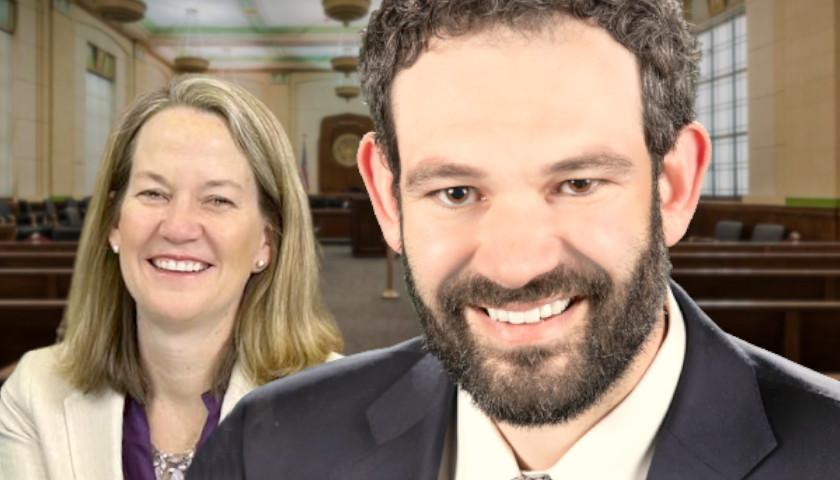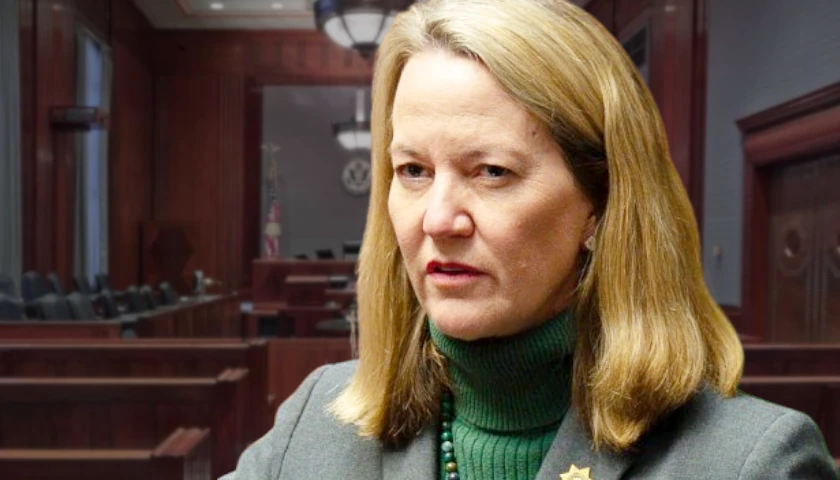State Representative Alexander Kolodin (R-Scottsdale) promised the Arizona House would examine Attorney General Kris Mayes’ decision to join a coalition of attorneys general seeking to restore the government’s ability to communicate censorship requests to social media websites.
“Labeling speech dangerous and calling for it to be suppressed is the first act of tyrants,” Kolodin (pictured above, right) wrote on X, formerly Twitter, in response to Mayes’ decision to join the coalition. He added that the Arizona House “will be taking a very close look” at the move.
Labeling speech dangerous and calling for it to be suppressed is the first act of tyrants. Rest assured the House will be taking a very close look at this! https://t.co/JAMb6p6fIj
— Rep. Alexander Kolodin (@realAlexKolodin) August 1, 2023
Mayes (pictured above, left) joined the coalition of 21 attorneys general in an amicus brief on Monday, stating in a press release that tech companies and the federal government “must have open communication in order to ensure the safety of Americans online.” Because of a stay that prevents such communication pending litigation, Mayes added that officials at all levels of government “cannot contact social media companies about dangerous online content.”
Federal officials were barred from communicating with social media companies for the purpose of censoring speech protected under the First Amendment last month due to a stay in Missouri v. Biden, in which the attorneys general of Louisiana and Missouri sued the Biden administration alleging the federal government is instructing social media companies to interfere with the First Amendment rights of their states’ citizens.
Western District of Louisiana Judge Terry A. Dougherty denied an appeal from the Biden administration days later, writing that the plaintiffs are likely to prove the government colluded with tech companies “to engage in view-point based suppression of free speech.”
The Arizona Sun Times contacted Mayes’ office to determine what types of “dangerous online content” she believes the government should ask to be removed, and asked for specific examples of removal requests made or advanced by the Arizona attorney general. A press contact for Mayes did not respond to an inquiry prior to press time.
Part of the efforts to remove such content, however, appears to have come from Maricopa County Recorder Stephen Richer, who worked with the Biden administration’s Cybersecurity and Infrastructure Security Agency (CISA), part of the Department of Homeland Security (DHS), to allegedly “manipulate elections,” according to attorney Christina Bobb.
Bobb, an attorney for former President Donald Trump through his Save America political action committee, revealed that Richer complained to CISA about “media disinformation,” citing a document showing Richer urged, “the federal government cannot stay silent and identified a void in the immediate aftermath of the 2020 election that allowed false information to circulate unchecked.”
Mike Benz, the executive director for the Foundation for Freedom Online, told The Sun Times that Richer assisted with CISA’s effort “to turn the secretaries of state into social media censorship cells that could instantly kill any story going viral on social media in any swing state.”
Last month it was reported that a separate lawsuit alleging social media censorship at the hands of the California Secretary of State’s Office of Election Cybersecurity may rise to the level of the Supreme Court. That case, O’Handley v. Weber, alleges that conservative social media influencer Rogan O’Handley was banned from Twitter in 2020 due to a request by California’s Office of Election Cybersecurity.
– – –
Tom Pappert is a reporter for The Arizona Sun Times and The Star News Network. Follow Tom on Twitter. Email tips to [email protected].
Photo “Kris Mayes” by Kris Mayes.





